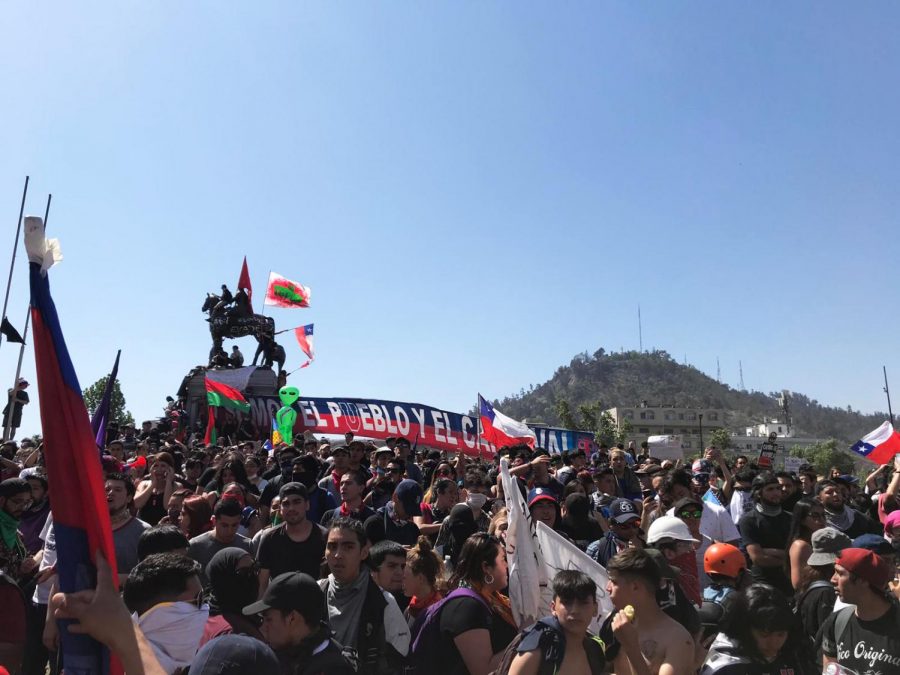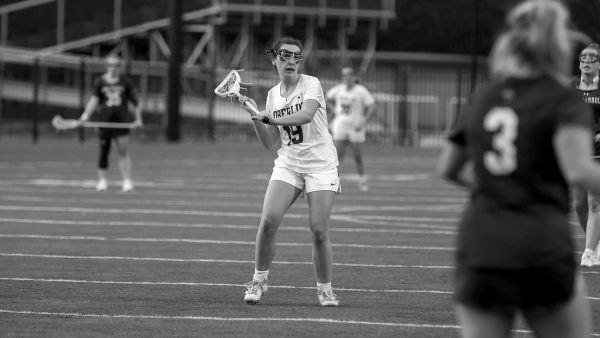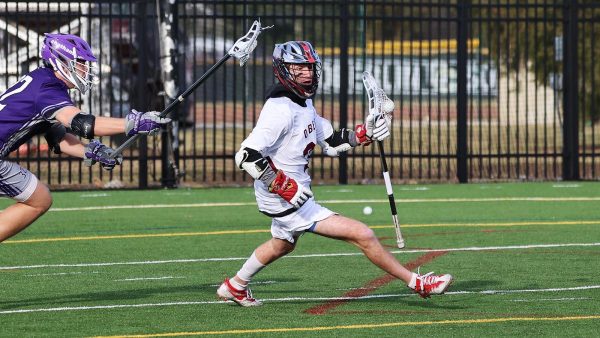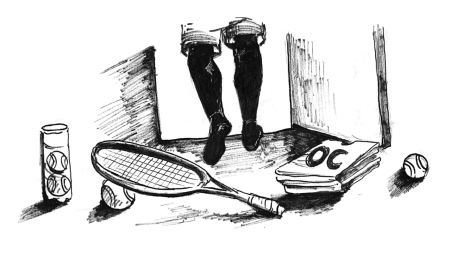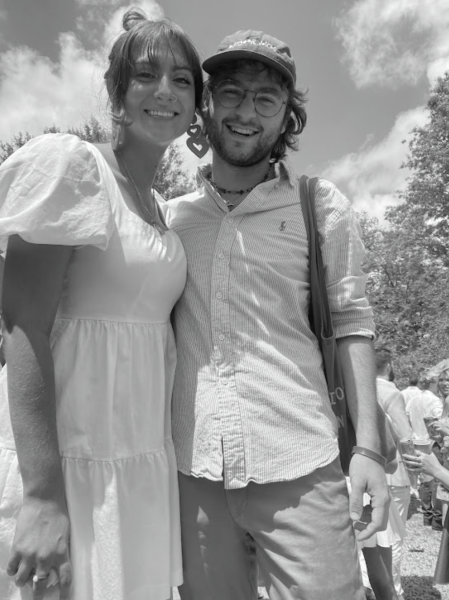College Third-Year, Lacrosse Player Alec Palmiotti Details the Chilean Protests from Santiago
Photo courtesy of Alec Palmiotti
Protesters demonstrating against the Chilean government.
On Oct. 18, Chilean citizens took to the streets in response to the government’s implementation of a raise in the cost of public metro fare. Alec Palmiotti, a College third-year varsity lacrosse player, has been a witness to this heightening unrest through his study away program in the country’s capital, Santiago.
“The [U.S. media] coverage on what’s going on in Chile has been flawed on multiple levels,” Palmiotti wrote in an email to the Review. “In some ways, [the protests are] a reaction to the hike in metro fare, but to focus on the metro issue is to trivialize what’s actually going on.”
Beginning in 1970 with the election of the world’s first democratically-elected socialist president, Salvador Allende, and his subsequent overthrow by a U.S.-backed coup that installed the 17-year-long military dictatorship of Augusto Pinochet in 1973, Chile has gone through drastic changes in government and economy over the last five decades.
However, the brutal effects of Pinochet’s dictatorship, which ended in 1990, can still be felt in the country today. Not only is the current president, Sebastián Piñera, the first billionaire to be sworn into office in Chile, but he is also the brother to Pinochet’s former Minister of Labor, Social Security, and Mining José Piñera. José is likely best remembered for his position as one of the infamous Chicago Boys, a group of Chilean economists who implemented strategies during the dictatorship that still affects the country’s economy today.
“What the people of Chile are [actually] protesting is, essentially, 30 years of neoliberal politics that have disproportionately benefited not only Chile’s one percent, but also the North American corporations operating in Chile,” Palmiotti wrote. “The minimum wage in Chile is more or less unlivable, middle-class pensions and retirement benefits are non-existent, the education and health care systems are defective and corrupt, and the vast majority of Chileans are fed up.”
Millions of people throughout the country are gathering to protest these inequalities in the plazas and streets of Chile’s major cities, the highest attendance since the reinstatement of democracy in 1990. There have been lootings and fires, as well as the deployment of over 10,000 Chilean troops who have utilized tanks, water cannons, tear gas, bludgeons, and other means to put an end to the demonstrations. So far, there have been 20 recorded deaths, hundreds injured, and more than 2,000 detained — many of whom are students.
The protests first began with college and high school students on social media encouraging the public to hop over turnstiles when entering the subway. Many protests in Chile have been student-led, such as the historic 2011–13 movement to de-privatize secondary and higher education and combat the larger issue of economic inequality. In the past few weeks, student leaders have been joined by civil society groups and others to aid their cause.
In a speech at the country’s presidential palace last Wednesday, Sebastián Piñera announced that Chile would be unable to host the upcoming UN Climate Change Conference in light of the protests.
He explained, “Our first priority as a government is to focus first and foremost on fully restoring public order and social peace.”
On a more personal level for Palmiotti, his day-to-day life in Chile has been different than what he had originally expected from study abroad.
“I was actually stuck in Calama, a small city in Chile that you fly into to get to the Atacama Desert, for three days because almost all domestic flights into Santiago were canceled due to the protests,” Palmiotti wrote. “There was also a national curfew for about a week, which meant that being out after a certain time, most commonly 10 p.m., was illegal.”
College fourth-year and former varsity soccer player Izzy Rosenstein had similar experiences when she studied abroad in the smaller Chilean port city Valparaíso last semester.
“I lived in the center of the city and could often see marches happening from my bedroom window and a couple of times I smelled and felt the sting of tear gas as I walked home,” Rosenstein said. “Protesting was embedded into the daily life of Valparaíso.”
Palmiotti explained that his experiences as an Oberlin student have prepared him to take part in the conversations around protesting and other political discourses while in Chile.
“Oberlin is an incredibly politically active place where people voice their opinions loudly,” Palmiotti wrote. “A lot of people in my program choose to avoid thinking about and discussing the protests entirely, which surprised me. I’m not sure to what extent Oberlin has made me better equipped to discuss and learn about the protests and what’s going on, but I’m certain it has [helped me].”
As a student in Chile, Palmiotti has had a close look at the demonstrations. However, he is not legally allowed to participate in the protests due to multiple Chilean laws regarding foreigners.
One of them, Decree No. 597 of 1984, Article 15, reads, “[El extranjero] comprometerse … a no participar durante su permanencia en Chile en la política interna ni en actos que puedan inferir molestias a los Gobiernos con los cuales se mantienen relaciones amistosas y a respetar y cumplir la Constitución Política.”
In English, this translates to: “[Foreigners] compromise … to not participate in internal politics nor in acts that can cause trouble toward the Government during their stay in Chile, with which they maintain friendly relations, and to respect and comply with the Political Constitution.”
Palmiotti, however, has still learned much from the political discourse and unrest that has developed around him in Santiago.
“I’ve been inspired by the fact that Chileans protest literally everything,” Palmiotti wrote. “Which isn’t to downplay what’s going on [in the country] right now, because this is different. But in general, if there’s something that is seen as an injustice or inequality, Chileans are [motivated to] protest until it’s changed. I hope that’s something I bring back [to the U.S.] with me.”
Looking beyond Chile’s geographic boundaries toward the rest of the world, Palmiotti hopes that the international media and public will pay attention.
“What’s going on here right now is pretty monumental,” Palmiotti wrote. “I’m just hopeful that more people take the time to learn about Chile’s history and how these protests are integral in setting the tone for the future of the country.”


